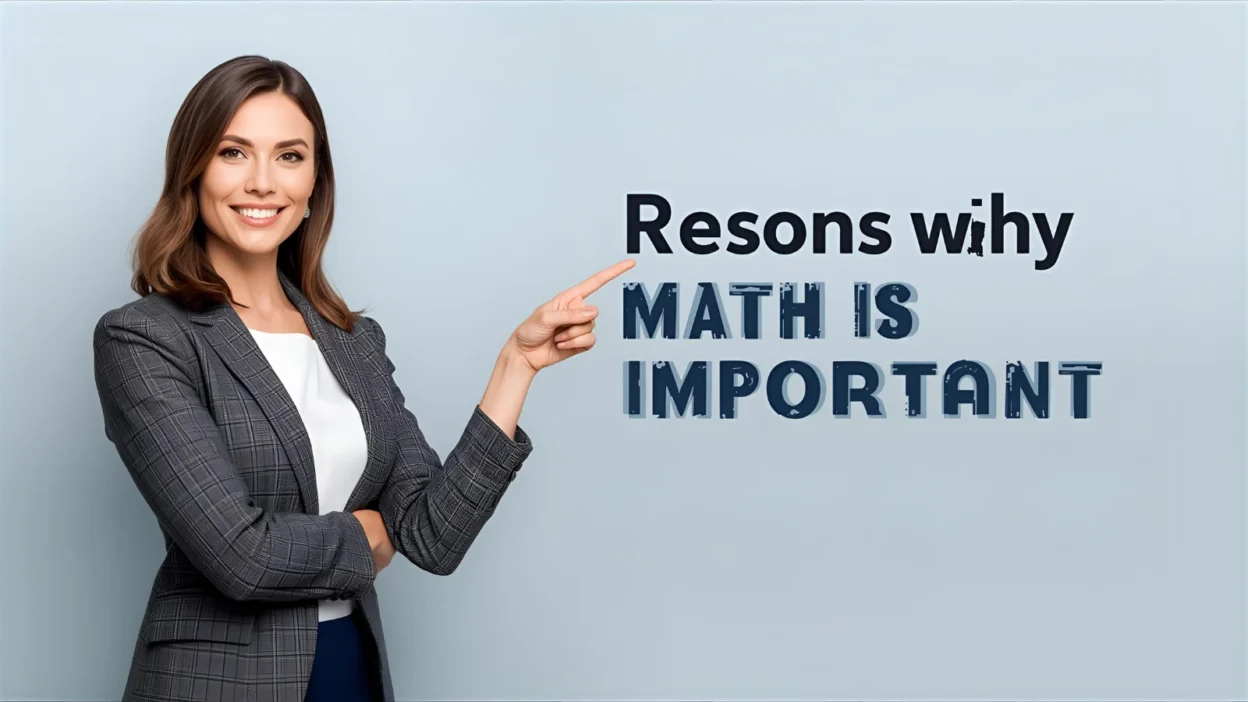Math isn’t just about numbers and equations — it’s the language of logic, problem-solving, and understanding the world around us. From managing money to building bridges, from coding software to baking a cake, math shapes nearly every part of daily life.
Even if it doesn’t seem obvious, math helps us think clearly, make better decisions, and understand patterns in everything.
In this article, we’ll explore the reasons why math is important, how it applies to real life, and why it’s more than just a school subject.
Understanding the Importance of Math
📘 Definition:
Mathematics is the study of numbers, patterns, shapes, and logical relationships. It teaches us how to analyze, measure, and make sense of data and structure.
Math is everywhere — in nature, technology, art, finance, and even emotions (yes, there’s math in music and architecture too!).
Math Improves Problem-Solving Skills
One of the biggest benefits of math is that it teaches how to think critically and solve problems logically.
- It trains the brain to look for patterns and connections.
- It helps people break down complex issues into smaller, manageable steps.
- It improves decision-making and reasoning.
🧩 Example: When you figure out how to split a restaurant bill or fix a technical glitch, you’re using mathematical thinking.
Math Is Essential for Daily Life
You might not solve algebraic equations daily, but you use math all the time — often without realizing it.
- Calculating discounts, taxes, and budgets.
- Measuring ingredients for cooking.
- Planning travel time and distances.
- Estimating bills or savings.
💡 Everyday math helps people live smarter and more efficiently.
Math Builds Logical and Analytical Thinking
Math trains the mind to think systematically. It’s not just about answers — it’s about the process.
- Encourages step-by-step reasoning.
- Teaches how to evaluate information objectively.
- Builds clarity and precision in thought.
🧠 Logical thinking gained from math is useful in law, science, business, and even writing.
Math Is the Foundation of Science and Technology
Every scientific discovery and technological innovation relies on math.
- Physics uses math to explain motion and energy.
- Chemistry uses formulas to measure reactions.
- Computer science uses algorithms — pure math in action.
- Engineering depends on geometry, algebra, and calculus.
🚀 Without math, we wouldn’t have smartphones, airplanes, or space exploration.
Math Supports Financial Literacy
Money and math go hand in hand. Understanding math helps you make smarter financial choices.
- Managing budgets, loans, and investments.
- Understanding interest rates and percentages.
- Analyzing data to make informed purchases.
💰 Example: Knowing how compound interest works can help you save thousands over a lifetime.
Math Develops Career Opportunities
Math is vital in countless professions:
- Engineering, architecture, and data science rely on math daily.
- Finance and accounting depend on mathematical precision.
- Medicine uses statistics for research and diagnosis.
- Technology and AI are built entirely on mathematical logic.
📊 Even creative fields like music, art, and design use mathematical symmetry and patterns.
Math Improves Communication and Precision
Surprisingly, math sharpens language and communication skills.
- It teaches clarity, structure, and accuracy.
- It trains the mind to express ideas logically.
- It helps avoid ambiguity — a vital skill in writing and speaking.
✍️ Example: A mathematician and a lawyer both need to present clear, logical arguments — math strengthens that ability.
Math Helps Us Understand the World
From natural patterns to human-made systems, math explains how the world works.
- The symmetry of flowers and shells follows mathematical ratios.
- Economic systems depend on statistics and probability.
- Climate scientists use mathematical models to predict change.
🌍 Math isn’t abstract — it’s a mirror of reality.
Math Encourages Creativity
Math and creativity go hand in hand. Artists, musicians, and designers all use mathematical concepts to create harmony and structure.
- Music relies on rhythm, fractions, and patterns.
- Architecture uses geometry and proportion.
- Digital art depends on algorithms and symmetry.
🎨 Example: The Golden Ratio — a mathematical constant — appears in famous artworks and nature’s designs alike.
Math Builds Confidence and Discipline
Solving math problems teaches persistence and patience.
- It encourages focus and resilience.
- Success in math builds confidence in tackling other challenges.
- It rewards consistency — effort leads to mastery.
💬 Quote: “Pure mathematics is, in its way, the poetry of logical ideas.” – Albert Einstein
Math Drives Innovation and the Future
Math powers artificial intelligence, data science, cryptography, and robotics — the fields shaping our future.
- Algorithms that run search engines are math-based.
- Space missions rely on precise calculations.
- Healthcare innovations use statistical modeling.
🚀 Learning math isn’t just about today — it’s about preparing for tomorrow.
Idioms Related to Math and Logic
| Idiom | Meaning | Example |
|---|---|---|
| “By the numbers” | Following rules carefully | The engineer worked strictly by the numbers. |
| “Add up” | Make sense logically | His story just doesn’t add up. |
| “Crunch the numbers” | Analyze data carefully | We need to crunch the numbers before investing. |
| “Zero in on” | Focus on something | She zeroed in on the key issue. |
| “Count on” | Rely or depend on | You can count on math to be accurate. |
Synonyms for Mathematics
| Synonym | Context / Example |
|---|---|
| Arithmetic | He’s great at mental arithmetic. |
| Geometry | Architecture depends on geometry. |
| Calculus | Calculus explains motion and change. |
| Statistics | Statistics helps interpret data. |
| Numeracy | Numeracy is essential for daily life. |
Grammar Note: Using “Math”
- Noun: Math is my favorite subject.
- Adjective: She took a math class.
- Plural (British English): Mathematics or maths both refer to the same concept.
📘 Tip: “Math” (American) and “Maths” (British) are interchangeable.
Math in Real Life — Practical Examples
- Shopping: Calculating discounts and totals.
- Cooking: Measuring ingredients in correct proportions.
- Traveling: Estimating fuel, time, and distance.
- Sports: Tracking scores, stats, and performance.
- Technology: Understanding data and coding logic.
📱 Math isn’t limited to textbooks — it’s woven into your everyday experiences.
The Future of Math Education
Modern learning tools are making math more engaging:
- Interactive apps, AI tutors, and gamified learning.
- Visual models and real-world problem-solving.
- Cross-disciplinary approaches combining math with art and coding.
💡 The goal? To make math not just understandable — but enjoyable.
FAQs About Math
Q1: Why is math important in life?
It develops reasoning, problem-solving, and decision-making skills used every day.
Q2: How does math affect other subjects?
Math supports science, technology, business, and even art.
Q3: Can someone succeed without math?
Every field needs basic numeracy — math builds confidence and logic essential for success.
Q4: What’s the best way to enjoy math?
Relate it to real life — games, puzzles, patterns, and personal finance make math fun.
Q5: Why do employers value math skills?
Because math shows you can think critically, analyze data, and make rational decisions.
Conclusion
Math is far more than formulas and equations — it’s a universal tool for understanding, solving, and creating. It strengthens the mind, drives innovation, and connects logic with creativity.
The strongest reason why math is important?
👉 Because it’s the foundation of progress — in life, learning, and the future of humanity.

Bret Lee writes educational and research-based content for Whygenix.com, focused on clarity, accuracy, and explaining why concepts matter through simple, engaging, reader-friendly writing.




